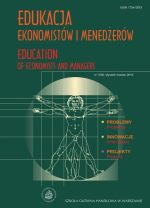Treść głównego artykułu
Abstrakt
Although existing models describing consumer behaviour offer a great deal of insight into the patterns and heuristic behind every customer’s buying decisions, they are not without serious limitations and operate as standalone units. Shopping intelligence, a completely new concept in economic psychology, not only attempts to merge the existing concepts into one, but to add value by allowing researchers to objectively assess respondent’s shopping style and capabilities in quantitative manner. Knowledge of these factors will allow the companies to be more competitive, by better tailoring their product, price and marketing strategies to the needs of its customers. It will also help entrepreneurs avoid losses due to inappropriate choice of the aforementioned strategies. Customers will too be beneficiaries, as they will receive a product that meets their demands better.
Szczegóły artykułu
Autor (Autorzy) artykułu oświadcza, że przesłane opracowanie nie narusza praw autorskich osób trzecich. Wyraża zgodę na poddanie artykułu procedurze recenzji oraz dokonanie zmian redakcyjnych. Przenosi nieodpłatnie na Oficynę Wydawniczą SGH autorskie prawa majątkowe do utworu na polach eksploatacji wymienionych w art. 50 Ustawy z dnia 4 lutego 1994 r. o prawie autorskim i prawach pokrewnych – pod warunkiem, że praca została zaakceptowana do publikacji i opublikowana.
Oficyna Wydawnicza SGH posiada autorskie prawa majątkowe do wszystkich treści czasopisma. Zamieszczenie tekstu artykuły w repozytorium, na stronie domowej autora lub na innej stronie jest dozwolone o ile nie wiąże się z pozyskiwaniem korzyści majątkowych, a tekst wyposażony będzie w informacje źródłowe (w tym również tytuł, rok, numer i adres internetowy czasopisma).
Osoby zainteresowane komercyjnym wykorzystaniem zawartości czasopisma proszone są o kontakt z Redakcją.
![]()
Referencje
-
1. Batra, R., Ahtola, O. (1990). Measuring the hedonic and utilitarian sources of consumer attitudes. Marketing Letters 2(2), 159–170.
2. Bodenhausen, G., Mussweiler, T., Shira, G., Moreno, K. (2000). Affective influences on stereotyping and intergroup relations affective influences on stereotyping and intergroup relations. Handbook of Affect and Social Cognition. Erlbaum, 321–343.
3. Gigerenzer, E.G., Hertwig, R. (2006). The priority heuristic: making choices without trade‐offs. Psychological Review, 113(2), 409–432.
4. Han, Y., Nunes, J., Drèze, X. (2010). Signaling status with luxury goods: the role of brand prominence. Journal of Marketing, 74, 15–30.
5. Hart, P.E., Nilsson, N.J., Raphael, B. (1968). A formal basis for the heuristic determination of minimum cost paths. IEEE Transactions of System Science and Cybernetics, SSC‐4, No. 2, 100–107.
6. Hirschman, E., Holbrook, M. (1982). Hedonic consumption, emerging concepts, methods and propositions. Journal of Marketing, 46(3), 92–101.
7. Hirschman, E., Stern, B. (1999). The roles of emotion in consumer research. Advances in Consumer Research, 26, 4–11.
8. Kahneman, D., Tversky, A. (1979). Prospect theory: an analysis of decision under risk. Econometrica, 47(2), 263–292.
9. Maison, D., Stasiuk, K. (2014). Psychologia konsumenta. Warszawa: Wydawnictwo Naukowe PWN.
10. Mano, H., Elliott, M. (1997). Smart shopping: the origins and consequences of price savings. Advances in Consumer Research, 24, 504–510.
11. O’Donoghue, T., Rabin, M. (2000). The economics of immediate gratification. Journal of Behavioral Decision Making, 13(2), 233–250.
12. Ruvio, A., Shoham, A., Makovec‐Brenčič, M. (2008). Consumers’ need for uniqueness: short form scale development and cross – cultural validation. International Marketing Review, 25(1), 33–53.
13. Schwarz, N., Bless, H., Strack, F., Klumpp, G., Rittenauer‐Schatka, H., Simons, A. (1991). Ease of retrieval as information: another look at the availability heuristic. Journal of Personality and Social Psychology, 61(2), 195–202.
14. Simester, E., Anderson, D. (2003). Effects of $9 price endings on retail sales. Evidence from field experiments. Quantitative Marketing and Economics, 1, 93–110.
15. Tversky, A., Kahneman, D. (1974). Judgment under uncertainty: heuristics and biases. Science. New Series, 185(4157), 1124–1131.
Referencje
2. Bodenhausen, G., Mussweiler, T., Shira, G., Moreno, K. (2000). Affective influences on stereotyping and intergroup relations affective influences on stereotyping and intergroup relations. Handbook of Affect and Social Cognition. Erlbaum, 321–343.
3. Gigerenzer, E.G., Hertwig, R. (2006). The priority heuristic: making choices without trade‐offs. Psychological Review, 113(2), 409–432.
4. Han, Y., Nunes, J., Drèze, X. (2010). Signaling status with luxury goods: the role of brand prominence. Journal of Marketing, 74, 15–30.
5. Hart, P.E., Nilsson, N.J., Raphael, B. (1968). A formal basis for the heuristic determination of minimum cost paths. IEEE Transactions of System Science and Cybernetics, SSC‐4, No. 2, 100–107.
6. Hirschman, E., Holbrook, M. (1982). Hedonic consumption, emerging concepts, methods and propositions. Journal of Marketing, 46(3), 92–101.
7. Hirschman, E., Stern, B. (1999). The roles of emotion in consumer research. Advances in Consumer Research, 26, 4–11.
8. Kahneman, D., Tversky, A. (1979). Prospect theory: an analysis of decision under risk. Econometrica, 47(2), 263–292.
9. Maison, D., Stasiuk, K. (2014). Psychologia konsumenta. Warszawa: Wydawnictwo Naukowe PWN.
10. Mano, H., Elliott, M. (1997). Smart shopping: the origins and consequences of price savings. Advances in Consumer Research, 24, 504–510.
11. O’Donoghue, T., Rabin, M. (2000). The economics of immediate gratification. Journal of Behavioral Decision Making, 13(2), 233–250.
12. Ruvio, A., Shoham, A., Makovec‐Brenčič, M. (2008). Consumers’ need for uniqueness: short form scale development and cross – cultural validation. International Marketing Review, 25(1), 33–53.
13. Schwarz, N., Bless, H., Strack, F., Klumpp, G., Rittenauer‐Schatka, H., Simons, A. (1991). Ease of retrieval as information: another look at the availability heuristic. Journal of Personality and Social Psychology, 61(2), 195–202.
14. Simester, E., Anderson, D. (2003). Effects of $9 price endings on retail sales. Evidence from field experiments. Quantitative Marketing and Economics, 1, 93–110.
15. Tversky, A., Kahneman, D. (1974). Judgment under uncertainty: heuristics and biases. Science. New Series, 185(4157), 1124–1131.
